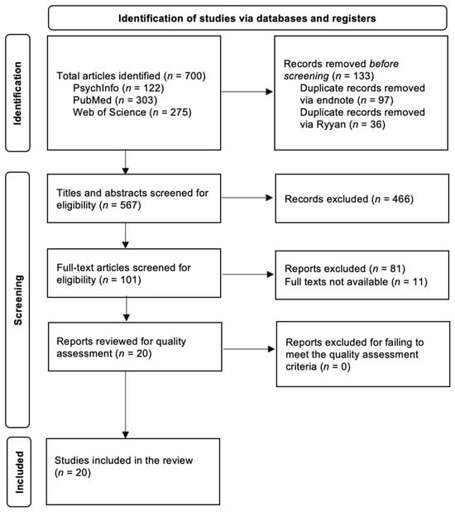12
Exploring the Intersection of ADHD and Music: A Systematic Review
www.mdpi.comAttention Deficit Hyperactivity Disorder (ADHD) is a highly prevalent neurodevelopmental disorder, affecting both children and adults, which often leads to significant difficulties with attention, impulsivity, and working memory. These challenges can impact various cognitive and perceptual domains, including music perception and performance. Despite these difficulties, individuals with ADHD frequently engage with music, and previous research has shown that music listening can serve as a means of increasing stimulation and self-regulation. Moreover, music therapy has been explored as a potential treatment option for individuals with ADHD. As there is a lack of integrative reviews on the interaction between ADHD and music, the present review aimed to fill the gap in research. Following PRISMA guidelines, a comprehensive literature search was conducted across PsychInfo (Ovid), PubMed, and Web of Science. A narrative synthesis was conducted on 20 eligible studies published between 1981 and 2023, involving 1170 participants, of whom 830 had ADHD or ADD. The review identified three main areas of research: (1) music performance and processing in individuals with ADHD, (2) the use of music listening as a source of stimulation for those with ADHD, and (3) music-based interventions aimed at mitigating ADHD symptoms. The analysis revealed that individuals with ADHD often experience unique challenges in musical tasks, particularly those related to timing, rhythm, and complex auditory stimuli perception, though these deficits did not extend to rhythmic improvisation and musical expression. Most studies indicated that music listening positively affects various domains for individuals with ADHD. Furthermore, most studies of music therapy found that it can generate significant benefits for individuals with ADHD. The strength of these findings, however, was limited by inconsistencies among the studies, such as variations in ADHD diagnosis, comorbidities, medication use, and gender. Despite these limitations, this review provides a valuable foundation for future research on the interaction between ADHD and music.



Even more abstract
(1) music performance and processing in individuals with ADHD, (2) the use of music listening as a source of stimulation for those with ADHD, and (3) music-based interventions aimed at mitigating ADHD symptoms. The analysis revealed that individuals with ADHD often experience unique challenges in musical tasks, particularly those related to timing, rhythm, and complex auditory stimuli perception, though these deficits did not extend to rhythmic improvisation and musical expression. Most studies indicated that music listening positively affects various domains for individuals with ADHD. Furthermore, most studies of music therapy found that it can generate significant benefits for individuals with ADHD.I frequently use music to manage my attention but where I struggle is music production. I can’t listen to music while MAKING music and so I’ve had trouble focusing, staying on task, and having fun with music production
I’m still investigating coping mechanisms for this since it’s an activity that is creatively engaging and I’d like to do more of it